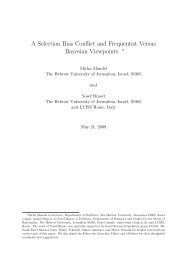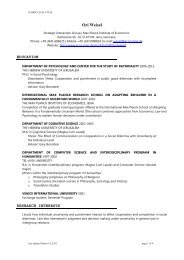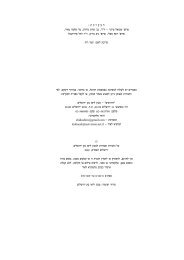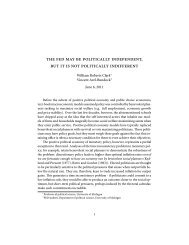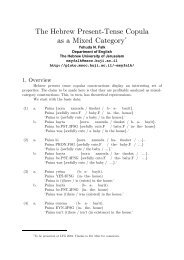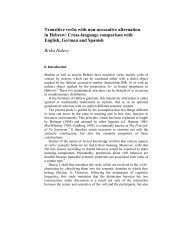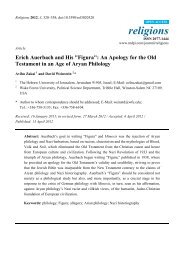Routine and the Perception of Time - Pluto Huji Ac Il
Routine and the Perception of Time - Pluto Huji Ac Il
Routine and the Perception of Time - Pluto Huji Ac Il
You also want an ePaper? Increase the reach of your titles
YUMPU automatically turns print PDFs into web optimized ePapers that Google loves.
550<br />
References<br />
Avni-Babad, D. (2001). Does routine influence people’s feelings? Unpublished<br />
manuscript, Hebrew University <strong>of</strong> Jerusalem, Jerusalem, Israel.<br />
Avni-Babad, D. (2003). Mental undoing <strong>of</strong> actions <strong>and</strong> inaction in <strong>the</strong><br />
absence <strong>of</strong> counterfactuals. British Journal <strong>of</strong> Psychology, 94, 213–222.<br />
Babad, E., Avni-Babad, D., & Rosenthal, R. (2003). Teachers’ brief<br />
nonverbal behaviors in defined instructional situations can predict students’<br />
evaluations. Journal <strong>of</strong> Educational Psychology, 95, 553–562.<br />
Block, R. A. (1978). Remembered duration: Effects <strong>of</strong> events <strong>and</strong> sequence<br />
complexity. Memory & Cognition, 6, 320–326.<br />
Block, R. A. (1982). Temporal judgments <strong>and</strong> contextual change. Journal<br />
<strong>of</strong> Experimental Psychology: Learning, Memory, <strong>and</strong> Cognition, 8,<br />
530–544.<br />
Block, R. A. (1985). Contextual coding in memory: Studies <strong>of</strong> remembered<br />
duration. In J. A. Michon & J. L. Jackson (Eds.), <strong>Time</strong>, mind, <strong>and</strong><br />
behaviour (pp. 169–178). Berlin, Germany: Springer-Verlag.<br />
Block, R. A. (1989). Experiencing <strong>and</strong> remembering time: Affordance,<br />
context, <strong>and</strong> cognition. In I. Levin & D. Zakay (Eds.), <strong>Time</strong> <strong>and</strong> human<br />
cognition: A life-span prospective (pp. 333–363). Amsterdam: North-<br />
Holl<strong>and</strong>.<br />
Block, R. A., & Reed, M. A. (1978). Remembered duration: Evidence for<br />
a contextual-change hypo<strong>the</strong>sis. Journal <strong>of</strong> Experimental Psychology:<br />
Human Learning <strong>and</strong> Memory, 4, 656–665.<br />
Block, R. A., & Zakay, D. (1997). Prospective <strong>and</strong> retrospective duration<br />
judgments: A meta-analytic review. Psychonomic Bulletin & Review, 4,<br />
184–197.<br />
Byrne, R. M. J., & McEleney, A. (2000). Counterfactual thinking about<br />
actions <strong>and</strong> failures to act. Journal <strong>of</strong> Experimental Psychology: Learning,<br />
Memory, <strong>and</strong> Cognition, 26, 1318–1331.<br />
Fraisse, P. (1963). The psychology <strong>of</strong> time. New York: Harper & Row.<br />
Gleicher, F., Kost, K. A., Baker, S. M., Strathman, A. J., Richman, S. A.,<br />
& Sherman, S. J. (1990). The role <strong>of</strong> counterfactual thinking in judgments<br />
<strong>of</strong> affect. Personality <strong>and</strong> Social Psychology Bulletin, 16, 284–<br />
295.<br />
Harton, J. J. (1939). The influence <strong>of</strong> <strong>the</strong> degree <strong>of</strong> unity <strong>of</strong> organization on<br />
<strong>the</strong> estimation <strong>of</strong> time. Journal <strong>of</strong> General Psychology, 21, 25–49.<br />
James, W. (1890). The principles <strong>of</strong> psychology (Vol. 1). New York: Holt.<br />
Kahneman, D., & Miller, D. L. (1986). Norm <strong>the</strong>ory: Comparing reality to<br />
its alternatives. Psychological Review, 93, 136–153.<br />
Kahneman, D., & Tversky, A. (1982). The simulation heuristic. In D.<br />
AVNI-BABAD AND RITOV<br />
Kahneman, P. Slovic, & A. Tversky (Eds.), Judgment under uncertainty:<br />
Heuristics <strong>and</strong> biases (pp. 201–208). Cambridge, Engl<strong>and</strong>: Cambridge<br />
University Press.<br />
L<strong>and</strong>man, J. (1987). Regret <strong>and</strong> elation following action <strong>and</strong> inaction:<br />
Affective responses to positive versus negative outcomes. Personality<br />
<strong>and</strong> Social Psychology Bulletin, 13, 524–536.<br />
Ornstein, R. E. (1969). On <strong>the</strong> experience <strong>of</strong> time. Harmondsworth, Engl<strong>and</strong>:<br />
Penguin.<br />
Poynter, W. D. (1983). Duration judgment <strong>and</strong> <strong>the</strong> segmentation <strong>of</strong> experience.<br />
Memory & Cognition, 11, 77–82.<br />
Poynter, W. D. (1989). Judging <strong>the</strong> duration <strong>of</strong> time intervals: A process <strong>of</strong><br />
remembering segments <strong>of</strong> experience. In I. Levin & D. Zakay (Eds.),<br />
<strong>Time</strong> <strong>and</strong> human cognition: A life-span prospective (pp. 305–331).<br />
Amsterdam: North-Holl<strong>and</strong>.<br />
Poynter, W. D., & Homa, D. (1983). Duration judgment <strong>and</strong> <strong>the</strong> experience<br />
<strong>of</strong> change. <strong>Perception</strong> & Psychophysics, 33, 548–560.<br />
Ritov, I. (2000). The role <strong>of</strong> expectations in comparisons. Psychological<br />
Review, 107, 345–357.<br />
Ritov, I., & Baron, J. (1995). Outcome knowledge, regret, <strong>and</strong> omission<br />
bias. Organizational Behavior <strong>and</strong> Human Decision Processes, 64,<br />
119–127.<br />
Webster’s new collegiate dictionary. (1980). Springfield, MA: Merriam-<br />
Webster.<br />
Wood, W., Quinn, J. M., & Kashy, D. A. (2002). Habits in everyday life:<br />
Thought, emotion, <strong>and</strong> action. Journal <strong>of</strong> Personality <strong>and</strong> Social Psychology,<br />
83, 1281–1297.<br />
Zakay, D. (1993). <strong>Time</strong> estimation methods: Do <strong>the</strong>y influence prospective<br />
duration estimates? <strong>Perception</strong>, 22, 91–101.<br />
Zakay, D., Block, R. A., & Tsal, Y. (1998). Prospective duration estimation<br />
<strong>and</strong> performance. In D. Gopher & A. Koriat (Eds.), Attention <strong>and</strong><br />
performance XVII: Cognitive regulation <strong>of</strong> performance: Interaction <strong>of</strong><br />
<strong>the</strong>ory <strong>and</strong> application (pp. 557–580). Cambridge, MA: MIT Press.<br />
Zakay, D., & Feldman, T. (1993). The role <strong>of</strong> segmentation <strong>and</strong> <strong>of</strong><br />
recallability in time estimation. Psychological Record, 43, 415–428.<br />
Zakay, D., Tsal, Y., Moses, M., & Shahar, Y. (1994). The role <strong>of</strong> segmentation<br />
in prospective <strong>and</strong> retrospective time estimation processes. Memory<br />
& Cognition, 22, 344–351.<br />
Received April 4, 2002<br />
Revision received June 17, 2003<br />
<strong>Ac</strong>cepted June 30, 2003



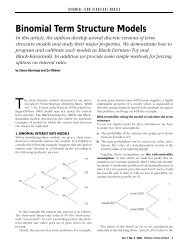
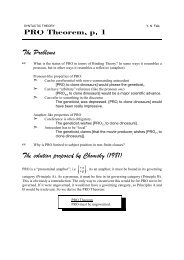
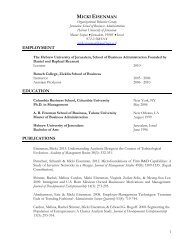
![CV [PDF] - Pluto Huji Ac Il](https://img.yumpu.com/18174585/1/190x245/cv-pdf-pluto-huji-ac-il.jpg?quality=85)
